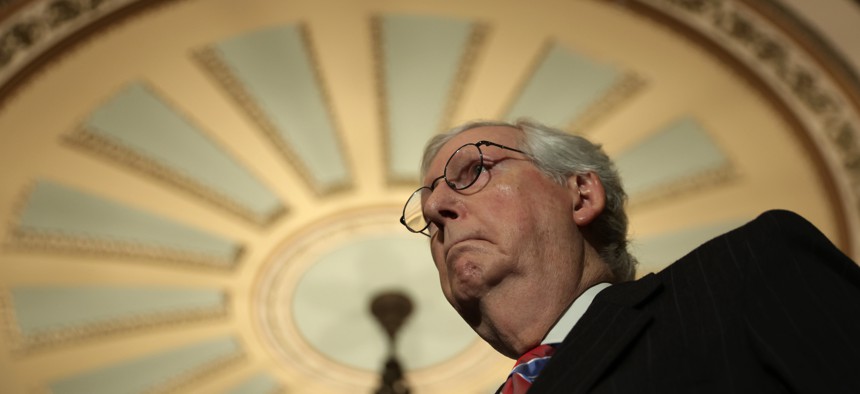McConnell Signals That Debate on State ARPA Aid Clawbacks Isn’t Over

Senate Minority Leader Mitch McConnell Getty Images/Alex Wong
As Democrats and the Biden administration seek $15 billion in new funding for the pandemic response, the Senate's top Republican calls them out for sending American Rescue Plan Act dollars to states “so flush with cash they don’t know how to spend it all.”
As the Biden administration warned that the government is running out of money for Covid testing and medications without $15 billion in emergency aid, a spokesman for Senate Minority Leader Mitch McConnell told Route Fifty Tuesday that Senate Republicans want to look first at unspent American Rescue Plan Act funds before agreeing to more Covid aid.
“Democrats were faced with a choice. They could either spend more money on Covid vaccines for kids and therapeutics or they could send money to states that are so flush with cash they don’t know how to spend it all. Democrats chose the latter,” said a spokesman for McConnell, a Kentucky Republican.
“Does the White House agree that states that are already flush with cash, should be prioritized over spending more money on vaccines for kids and therapeutics?” he said.
The Biden administration’s emergency request for additional funding is stalled over how to pay for it. Lawmakers negotiating the $1.5 trillion spending bill approved last week initially agreed to raise about half of the Covid funds requested for the Department of Health and Human Services by clawing back around $7 billion in ARPA dollars that were promised to 30 states with low unemployment.
The idea was pulled after Democratic lawmakers and state and local officials rebelled. Democratic leaders in the House took the Covid-19 funding measure out of the larger bill, and have said they intend to pass it on its own and send it to the Senate this week. However, at least 10 Republicans would have to vote for the new funding for it to clear Congress.
In interviews with Route Fifty, Senate Republicans continued to express disappointment that the Biden administration hasn’t given a more current accounting of how the ARPA funds are being spent.
“I've encouraged the administration to be very upfront about where those funds are and see if the Congress can use some of them,” said Sen. Roy Blunt, a Missouri Republican, chairman of the Senate Republican Policy Committee.
“We’ve got $33 trillion of debt. We’ve got to watch how we spend the money,” said Sen. Rick Scott, the former Republican governor of Florida. Scott said states should have been spending ARPA dollars to respond to the pandemic. “It’s something we ought to be reviewing to make sure that it's going for Covid response and it’s not being wasted,” he said.
Three dozen Republican senators, including McConnell, suggested in a letter to Biden earlier this month that it is unclear how states and localities are using ARPA dollars, and said they want a further accounting of the spending before they consider additional emergency Covid funding.
“Since the passage of the American Rescue Plan, questions are mounting about where exactly the additional money has gone,” the senators wrote. Blunt and Scott, however, did not sign the letter.
Echoing his fellow Republicans’ concerns, Sen. Roger Wicker of Mississippi, on Tuesday, called on a committee made up of the inspectors general of several departments to conduct an oversight review into pandemic-related spending to ensure broadband funds are being used appropriately for assisting unserved communities and those economically affected by the pandemic.
Wicker, in a letter to the Pandemic Response Accountability Committee created by the CARES Act, noted that Congress had created a subsidy to help low-income households afford broadband and included another $10 billion in broadband funds in ARPA.
“The speed at which funds were disbursed in response to the COVID-19 pandemic, and the sheer amount of money involved, put the funds at high risk of fraud and misuse, making the work of oversight entities like the PRAC and IGs essential to a successful national recovery,” Wicker wrote.
Sen. Bob Casey, a Pennsylvania Democrat, said that it would be unfair to take back ARPA funds given the money is not required under the law to be completely spent yet. “The arrangement that we had in the rescue plan was not only to get states help, but you get a couple of years to spend the money,” he said. “So I don't think we should be clawing back on these investments. They got holes in their budget.”
However, it’s unclear how Congress will proceed, prompting the Biden administration to tell reporters during a call on Tuesday that without more funding, HHS would have to cancel orders of anti-Covid drugs and reduce testing for the virus.
“HHS will begin to scale back this program starting next week and end it completely in early April,” a senior administration official told reporters.
More concerning, the official said, would be the cancellation next week of orders of drugs to treat Covid patients. Testing will also have to wind down in the second half of this year, the official warned, as will research and development of new Covid treatments.
“We will leave to Congress the details of how they get this over the finish line,” the official said. “There’s bipartisan recognition that we need this money and that the money they provided over a year ago has been well spent, but we defer to Congress on the specific legislative approach.”
Kery Murakami is a senior reporter for Route Fifty.
NEXT STORY: Minneapolis Teacher Strike Is Part of a Wider Labor Struggle for Educators Around the Country






